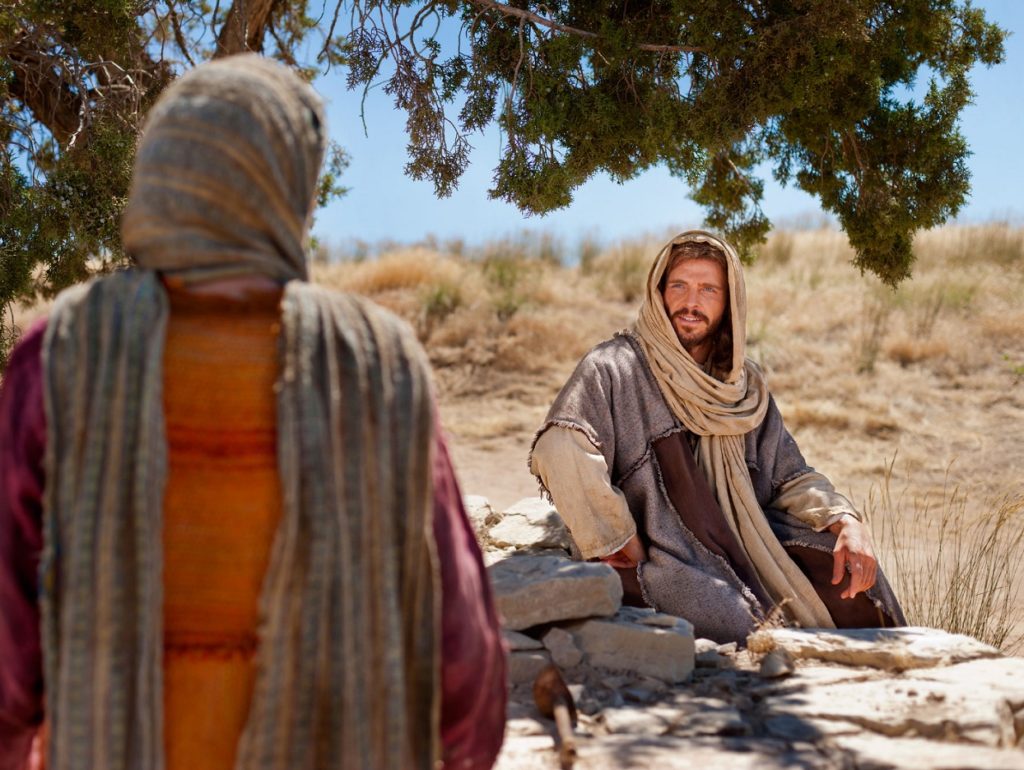JC & the Law: the woman at the well … (12/15/18)
Next, John 4 regales us with the story of Jesus and “the woman at the well” – a tale intriguing for a number of reasons, first and foremost of which being its setting: at Jacob’s Well, which happened to have been located in the land of Samaria. And this location is significant for three reasons – first, because the well had once belonged to Jacob – the grandson of Abraham and the quite literal father of Israel (seeing as how his name was changed to “Israel” in Genesis 32:28, and he was the third man in the Bible with whom God himself made a holy covenant); second, because many scholars have noted that the scene in John 4 appears to be modeled on the standard betrothal scenes1 portrayed in Hebrew scriptures (particularly the one involving Rachel & Jacob himself in Genesis 292); and third, because the well was located in Samaria and the woman was therefore a Samaritan3. As such, the setting itself establishes an intimate union with the Old Testament scriptures and their established Law – the Law that Jacob himself at least indirectly violated by having sexual relations with his uncle’s daughter (Genesis 29:10 – implicitly violating the edicts of Leviticus 18:12-14; which precludes sexual relations between a man and his aunt, and therefore logically also between a man and his uncle’s daughter), the written Law that forbade being kind towards (indeed, that actually forbade not killing) Samaritans (see Number 31:1-7 & Deuteronomy 20:16-17 – as well as the same implications mentioned at the end of John 4:9), and the traditions (or “Oral Law”) of the Pharisees – traditions that forbade men from socializing with women in public (hence his disciples’ surprise at witnessing the same upon their return in John 4:27), traditions that forbade all drinking from ritually unclean vessels (which her non-Jewish bucket most certainly was when he asked for its cooling contents in John 4:7), and traditions that most certainly forbade all rabbi from openly discussing theology with women at all.
And yet Jesus was not a rabbinical representative of the Law. Rather, he was a self-professed reformer thereof, and as such it can come as little surprise that even in this instance he is using both word and deed to preach the same – not only being kind to a Samaritan woman in need of comfort (in direct violation of Laws written as well as traditions oral), but even going out of his way to boldly (even heretically) state that “the hour is coming when you will worship the Father neither on this mountain nor in Jerusalem … For the hour is coming, and is now here, when the true worshipers will worship the Father in spirit and truth … For God is spirit, and those who worship him must worship in spirit and truth.” (John 4:21-24)

……………………………………………………..
1NOTE the obvious commentary Jesus makes on the brittleness of marriage, coupled with the tempting bonds of sexual desire, in John 4:16-18 – words uttered in marked contrast with the Old Testament; a testament that encouraged the social union of marriage (via Genesis 2:24 et al) and that demanded humans “be fruitful and multiply” (via the Elohim’s very first commandment in Genesis 1:28); both in dramatic contrast with Jesus’ rare but pointed protestations against the same (against betrothal via Matthew 22:30 and against sexual interaction in general via Matthew 19:12).
2It is highly intriguing as well to compare the language of Genesis 29:2-3 (“The stone on the well’s mouth was large, and when all the flocks were gathered there the shepherds would roll the stone from the mouth of the well, water the sheep, and then put the stone back in its place”), the scene at the well in John 4 involving Jesus and the Samaritan woman, and the resurrective language of Matthew 27:57-60, John 19:38-42, Mark 16:4 (“When they looked up, they saw that the stone, which was very large, had already been rolled back”), & John 20:1 – especially in light of the fact that water was used as a symbolic representation of “the Spirit within” throughout the texts of the Bible.
3While it is true that the Gospel of Matthew quotes Jesus as telling his followers to avoid socializing with or preaching to the Samaritans (see Matthew 10:5), this restriction had clearly been reversed by the time his ministry came to a close (see Matthew 28:19). Indeed, even in Luke’s accounting of Acts 1:8 we see Jesus quite clearly promising his disciples that they will indeed be witnesses to the Samaritans.




 ;
;